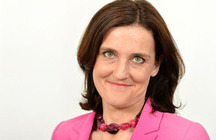The speech made by Theresa Villiers, the Conservative MP for Chipping Barnet, in the House of Commons on 26 January 2023.
I feel immensely privileged to be called to take part in what has been an outstanding debate this afternoon that has shown this House at its best. I particularly commend the contribution of my right hon. Friend the Member for Beckenham (Bob Stewart).
Before turning to the appalling events of the holocaust, I want to speak about another European genocide that took place in Europe in the 20th century: the holodomor. Ninety years ago, during the winter of 1932-33, the confiscation of crops led to the death of millions in the Soviet Union, mainly Ukrainian peasant farmers. It is hard to say how many Ukrainians died, but it was probably at least 7 million. The almost universal view of historians is that the famine was man-made, inflicted as a deliberate policy by Stalin to force Ukrainian farmers into collectivism. His regime wanted to break the resistance of Ukrainian identity and culture, which it viewed as a threat to Russian Soviet rule.
Entirely unrealistic quotas for agricultural production were set. When not achieved, all produce was confiscated, and mass starvation followed. At the height of the crisis, around 25,000 were dying every day. Bodies piled up at the roadside and at railway stations as people tried desperately to flee but never made it. With the return of Russian aggression towards Ukraine, surely now is the time for us to formally recognise the holodomor for what it was: an attempt at genocide directed against the Ukrainian people.
Turning to the holocaust, I want to talk about my constituent, Mala Tribich. She was born in 1930 in Poland. In 1939, her family were forced into a ghetto, but she and her cousin Idzia were taken in by a Christian family in another town. They lived in dangerous and vulnerable circumstances, constantly at risk of discovery. Idzia was moved to live with another family and was never seen again. Her death remains a mystery to this day. Back in the ghetto, Mala’s family were living in increasingly appalling conditions, crammed in the corner of a room with many other families. Her mother and sister were taken away and imprisoned in a synagogue. They were brutalised, starved, shot at, and then taken away and murdered in nearby woods.
By this time, Mala was in the ghetto with her father and brother and had become caregiver to her five-year-old cousin, Hania. When the ghetto was liquidated in July 1943, the two children were put in line to board lorries going to concentration camps. Mala bravely asked one of the SS guards if she could return to the ghetto. Incredibly, he said yes, but as she turned to go back she was told that the permission to re-enter applied only to her, not to little Hania. Mala was faced with the agonising choice of either leaving this vulnerable little girl behind to certain death or staying with her, losing her family forever, and potentially losing her own life. In the end the guard relented, and they were both allowed back. The Nazis inflicted these appalling choices on millions of people during the holocaust.
Mala and Hania were in the ghetto for another year, until November 1944, when they were put into cattle trucks with no food or water and transported first to Ravensbrück concentration camp and then to Bergen-Belsen. They arrived to scenes of unspeakable horror, with bodies strewn around the camp and thousands dying of starvation and disease. Somehow, those two little girls survived and were liberated from Bergen-Belsen on 15 April 1945. Having gone through all that, Mala was still just 14 years old.
I feel that I just do not have the words to do justice to that story, but I wanted to tell it to the House today because I believe that one of the reasons the personal testimony of survivors such as Mala has so much power is that it reminds us of the individual people behind the horrific statistics—the ordinary people who, before the rise of the Nazis, were living such ordinary lives, just like us, with the same hopes and aspirations, no doubt the same anxieties and irritations, and the same strengths and weaknesses.
My 92-year-old constituent told her story to a gathering in Woodside Park synagogue at the weekend, as she has in hundreds of other settings over many years. She told it with incredible poise, dignity, courage and resilience. The gathering was hosted by the shul in partnership with the Barnet Multi Faith Forum, and people of all faiths and backgrounds were there to remember the holocaust and its victims, and to pledge to root out anti-Jewish racism wherever it emerges. That is a commitment I repeat to the House today, because we must never, ever let this appalling history repeat itself.
